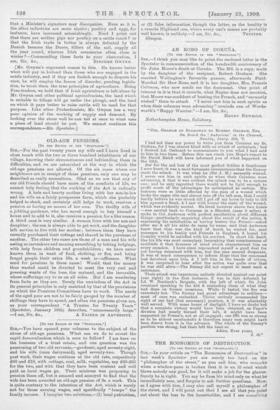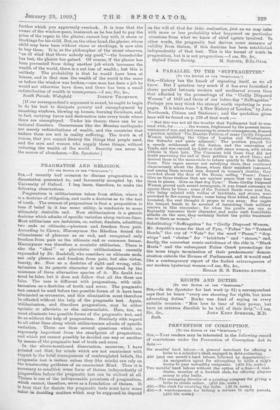THE ECONOMICS OF DESTRUCTION,
[To THE EDITOR ON TRIO .13p xarkrolt.1 SIR,—In your article on "The Economics of Destruction" in last week's Spectator you are surely too hard on the "philosopher of the street," as you call him, who remarks when a window-pane is broken that it is an ill wind which blows nobody any good, for it will make a job for the glazier. Surely he is right. You say he fixes his mind only on what be immediately sees, and forgets to ask further questions. Now, as I agree with him, I may also call myself a philosopher of the street, and I will point out that I see all that you point out about the loss to the householder, and I see something further which you apparently overlook. It is true that the owner of the window-pane, inasmuch as he has had to pay the price of the repair to the glazier, cannot buy with it shoes or stockings for his child. But, on the other hand, the glazier, whose child may have been without shoes or stockings, is now able to buy them. It is, as the philosopher of the street observes, "an ill wind that blows nobody any good,"—the householder has lost, the glazier has gained. Of course, if the glazier has been prevented from doing another job which increases the wealth of the world, there is a net loss of wealth ; but this is unlikely. The probability is that he would have been at leisure, and in that ease the wealth of the world is the same as before the window was broken,—one man has done a job he would not otherwise have done, and there has been a small redistribution of wealth in consequence.—I am, Sir, &o., [If our correspondent's argument is sound, he ought to begin to do his beet to dissipate poverty and unemployment by smashing windows, blowing up houses, burning furniture, and, in fact, carrying havoc and destruction into every trade where there are unemployed. Under his theory, there can be no national disasters. Occurrences like the Messina earthquake are merely redistributions of wealth, and -the countries that endure them are not in reality suffering. The truth is, of course, that you cannot destroy the things that people need, and the men and women who supply those things, without reducing the wealth of the world. Scarcity can never be the source of abundance.—En. Spectator.]







































 Previous page
Previous page